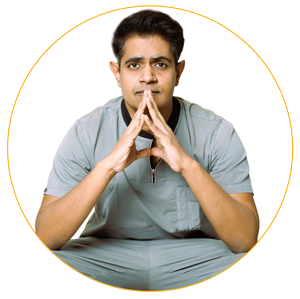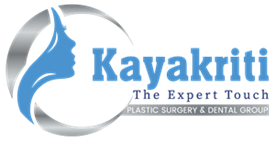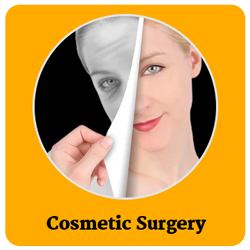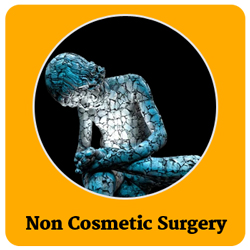Jaw Dislocation
Jaw dislocation means dislocation of the Temporomandibular Joint.

Jaw dislocation means dislocation of the Temporomandibular Joint.
Jaw Dislocation is a condition where lower jaw (condyle of lower jaw) moves forward out of its functional position within skull bone (glenoid fossa of temporal bone) to come and lie infront of the articular eminence and gets locked in this position. It leads to stretching of the ligaments and severe spasm of the muscles resulting insevere pain in mouth and the facewith inability to close the mouth. The resultant spasm prevents the condyle from returning back to its natural and normal position.
Temporo- mandibular joint (TMJ) is located on both sides of face, just in front of the ears and connects our lower jaw (the mandible) to the skull bone (temporal bone). TM Joint- slides as well as rotates and assist in movements like chewing and speaking.
Temporo-mandibular joint (TMJ) is unique as joint on both the sides of face functions as one unit. Since TMJ is connected to the mandible, the right and left joints must function together and therefore are not independent of each other. It hasgliding function (side to side) and hinging (front and back) function. During all the movements of the jaw, only the lower jaw moves
TM Joint Dislocation may be reducible if the condyle returns spontaneously (subluxation) or irreducible when one or two condyles remain dislocated (luxation).
Jaw dislocation can be acute and sudden or chronic and recurrent.
- If dislocation is sudden and acute- manual reduction should be done
- If dislocation is recurrent and chronic- treatment is by autologous blood injection or by surgery
Causes Of Jaw Dislocation
Which patients are prone to Jaw dislocation?
- Anatomic mismatch between the fossa where the condyle sits and articular eminence bone in the front,
- Weak joint capsule and
- Weak temporomandibular ligaments and
- Torn ligaments.
Patients who have had one episode of dislocation are predisposed to recurrence.
What are the causes of Jaw dislocation?
- Extreme opening of the mouth during yawning, laughing orvomiting
- After injuries to face during sport
- Dislocation also can result from dystonic reactions to drugs,
- Seizures, or tetanus infection.
- Temporomandibular joint disorder (TMJ Disorder) with pain, abnormal jaw movements and clicks.
- Most dental treatments require the patient to open his or her mouth wide for a long period of time, which makes it likely for the dislocation to occur in susceptible patients.
Symptoms of Jaw Dislocation
TMJ Dislocation can be acute and sudden and can result in locked jaw, or a jaw that sticks out forward
- The mouth remains open and the front teeth do not meet, due to the action of the elevator muscles with or without deviation to one side, and depending on whether the dislocation is one sided or both sided
- Head of the mandible is not at its usual position and the place is empty
- A dislocated jaw can interfere with eating and sleeping. It will also feel stiff, swollen and sore.
- Pain in the TMJ joint that gets worse when jaw is moved
- Upper and lower teeth don't match properly
- Unable to move the jaw or close mouth properly
- Difficulty in speaking or swallowing
- Drooling of saliva
Diagnosis of Jaw Dislocation
Jaw dislocation is more of a clinical diagnosis. Once you visit us, we will examine you completely but would require the following investigations for confirmation of diagnosis-
- X-rays to See the status of your jaw
- CT scan to provide detailed images of the bones involved in the joint
- MRI for detailed analysis of the joint space, joint disk or surrounding soft tissue. This is usually not done in TMJ dislocations
Points to Remember if you have Jaw dislocation
- Seek medical attention straight away if you think you have a dislocated jaw.
- Do not attempt to reduce it on your own.
- On the way to hospital, hold the jaw in place with your hand or with a loose bandage.
- Never make the bandage too tight — you should be able to remove it easily in case you vomit.
- After the jaw is back in place, you can control pain with medicines and a cold pack for 10 to 20 minutes at a time every 2 to 3 hours.
Self-care in preventingJaw Dislocation
- Use a mouth guard, helmet or other safety equipment to protect face during sport.
- Asking the patient to bite on a bite block and ensuring adequate rest during prolonged dental treatment
- Take treatment for TMJ Disorder (pain, click)
- Do not open your mouth too wide
- Do not avoid warning signs of Dislocation
Self-care in preventing Recurrent Jaw Dislocation
- Eat soft foodsto chew less
- Avoid chewing gum, don’t clench your jaw tightly
- Do not open your mouth too wide.
- Wear a mouthguard at night to prevent from grinding teeth, and
- Relaxation exercises to minimise stress.
- Exercises to strengthen jaw can also help.
Treatment of Jaw Dislocation
- Acute and sudden Jaw dislocation which ‘locks’is an emergency and is reduced with conservative approach.Joint will be manipulated back into its correct position either manually or in few cases by surgery. A local anaesthetic will be givenso as to not feel any pain, and medicines to relax muscles so the jaw can be moved back into place properly.
- Once the jaw is back in place, it will need to be kept stable with bandages that prevents from opening the mouth too wide.
- Care should be exerted for minimum 6 weeks to not open mouth wideafter reduction of jaw.
- Jaw should be supportedwith hand every time you sneeze or yawn during this time
- Recurrent Jaw dislocation can be prevented with
- Injection of autologous blood into the TM joint
- Wearing occlusal splints
- Treatment of Chronic Recurrent Jaw Dislocationis with Open Joint Surgery-
- Removal of the condyle head
- Removal of the articular eminence
- Release of temporalis muscle
Open joint surgery has a longer healing time and a chance of injury to frontal branch of the facial nerve but still is the surgery of choice in patients with recurrent painful clicks and joint dislocations
Know your surgeon better

Best plastic surgeon, Dr. Amit Agarwal is an American Board Certified, extensively trained, and best Plastic & Aesthetic surgeon in Lucknow. He is the Chief Plastic Surgeon heading the Department of Plastic, Microvascular, and Craniofacial surgery at Vivekananda Polyclinic and Institute of Medical Sciences, Lucknow, U.P, India. He maintains a busy practice at Avadh and Nishat Hospital and his own center - Kayakriti Plastic Surgery & Dental Center. He was formerly a Consultant in the Department of Plastic Surgery and Burns at the prestigious SGPGI, Lucknow.
MS, DNB (General Surgery) MCh, DNB (Plastic Surgery),
MNAMS, FACS, FICS, FRCS (Edinburgh, UK)
His Credentials
Three pillars of kayakriti
Privacy
We believe your experience with us should be comfortable and hassle-free to make it one of your best lifetime experiences for yours. We, here at the clinic, take full precautions to maintain your privacy in any manner. We also provide a staff who will receive you from the gate and take you to the chamber directly if you demand.
Trust
Our Surgeon is highly qualified and internationally certified with a team of skilled staff to perform any surgical or non-surgical treatment on your body.
Safety
When you plan to undergo any surgery you should always keep in mind that it's your body and it's a surgery. We, here always keep your safety a priority and will never recommend you to undergo any such procedure which is not safe for you. We also provide you with a detailed description of the complications which may occur after the surgery during the consultation as it's a surgical procedure so there may be some complications depending on the way your body reacts.
Kayakriti in news



Frequently Asked Questions
If you have flat or small breast and you want to improve your breast and hip contour ratio then you are a good candidate for it. The answer will be best provided after the first consultation with Dr Amit Agarwal.
Acute pain will be there for almost a week which gradually reduces and there will be soreness and swelling which may take up to 3 weeks to subside.
You can join your work and daily routines after a week of the procedure and can start exercising after 3 weeks of it.
Yes, you have to wear it round the clock unless we suggest you to remove it.
This surgery does not affect the ducts or the areas of the breast involved in milk production. Thus, it does not affect the breast feeding.
This surgery does not affect the ducts or the areas of the breast involved in milk production. Thus, it does not affect the breast feeding.












Kayakriti Plastic Surgery & Dental Center
D-43, Near Punjab National Bank, Rajajipuram, Lucknow, Uttar Pradesh - 226017, India
Phone No. +919695940009, +919695940006
Map Location





























Social Media Presence